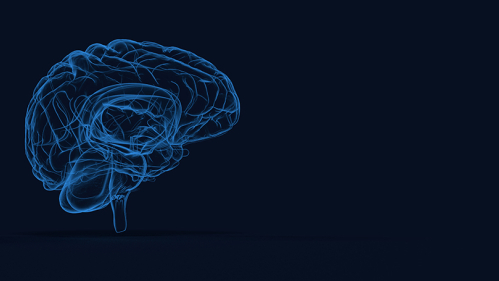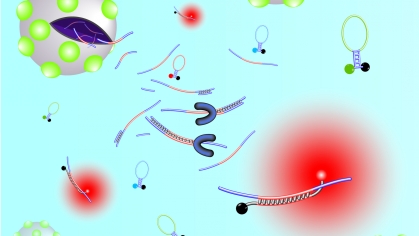Rutgers and Princeton Receive a $16 Million Grant to Study How the Brain Infers Hidden Causes for Decision Making

Psychology and neuroscience experts are researching latent cause interference, alterations of which are thought to underlie a range of mental disorders
Researchers from Rutgers and Princeton universities will use a $16 million federal grant award to collaborate on several research projects aimed at better understanding a key brain process that may be disrupted in mental health disorders.
The five-year grant from the National Institute of Mental Health was awarded to faculty in the Rutgers Brain Health Institute (BHI) and their colleagues at Princeton.
The research team will study latent cause inference, a process through which humans infer the hidden (latent) causes of events for perceiving, learning and decision-making. Alterations in this cognitive process are thought to underlie a wide range of mental health disorders, such as anxiety, compulsive behaviors and schizophrenia. The initiative will utilize a computational psychiatry approach that uses interdisciplinary methods including neuroimaging and computational modeling to explore brain function and to understand and treat mental disorders. The research initiative aims to bridge the gap between abstract symptoms and basic neurocognitive mechanisms.
“This grant will advance our understanding of mental health disorders but also push the boundaries of computational psychiatry,” said Gary Aston-Jones, the Murray and Charlotte Strongwater Endowed Chair in Neuroscience and Brain Health and director of BHI. “The program will be a major advancement in mental health research, with the potential to fundamentally reshape the diagnosis, understanding and treatment of mental health disorders.”
Funding from the Silvio O. Conte Center for Translational Mental Health Research P50 grant will support a comprehensive research program with three main objectives:
- Quantifying individual differences in latent cause inference and relating them to mental health symptoms
- Investigating alterations in this cognitive process within clinical populations
- Mapping the neural circuitry underlying latent cause inference
“Our researchers from Rutgers and Princeton have a strong history of collaboration, with each team member contributing to multiple projects and cores,” said Yael Niv, principal investigator of the study. “This integrated approach ensures a seamless flow of knowledge and methodologies.” Niv is a professor of psychology and neuroscience at Princeton University and co-director of the Rutgers-Princeton Center for Computational Cognitive NeuroPsychiatry (CCNP) within BHI.
The collaborative program will span four interconnected projects led by BHI core faculty and Princeton researchers, each designed to uncover different aspects of latent cause inference and its impact on mental health:
- Project 1: Latent Cause Inference as a Fundamental Cognitive Process
Led by Niv, Nathaniel Daw, professor of neuroscience and psychology at Princeton and Andrew Westbrook, assistant professor of psychiatry at Robert Wood Johnson Medical School (RWJMS), this project will investigate the relationship between individual differences in latent cause inference and dimensional mental health symptoms, as well as the neural circuitry involved. - Project 2: Latent-Cause Inference in Compulsion
Led by David Zald, director of the Center for Advanced Human Brain Imaging Research and Henry Rutgers Term Chair and Professor of Psychiatry at RWJMS, and Anna Konova, co-director of the CCNP and Assistant Professor of Psychiatry at Rutgers University Behavioral Health Care and RWJMS, this project will explore a novel interpretation of compulsive disorders – such as obsessive-compulsive disorder and drug misuse – as resulting from over-splitting of latent causes. - Project 3: Latent Cause Inference in Anxiety
Led by Kenneth Norman, professor of psychology and neuroscience at Princeton, Avram Holmes, associate professor of psychiatry at RWJMS and Niv, this project will examine the interaction between latent cause inference and memory processes and how failures in this interaction contribute to anxiety disorders. - Project 4: Neural Mechanisms Underlying Latent Cause Inference
Led by Gary Aston-Jones and Ilana Witten, professor of psychology and neuroscience at Princeton, this project will probe the neural mechanisms of latent cause inference using high-density neuronal recordings and chemogenetic manipulation of the neuropeptide orexin in the rat amygdala nuclei.
The four projects will be supported by three research cores: behavioral testing and clinical assessment, computational modeling, and neuroimaging, led by Konova and Niv, Daw and Jonathan Cohen, professor of psychology and neuroscience at Princeton, and Zald, Norman and Jeffrey Luci, research assistant professor of psychiatry at Rutgers, respectively.
“We will provide a comprehensive characterization of individual differences in latent cause inference and their relationship to symptom dimensions and clinical categories, as well as their underlying neural circuitry, proposing latent cause inference as a new NIMH Research Domain Criteria (RDoC) dimension,” said Aston-Jones. The RDoC framework was initiated by NIMH to create a set of research principles for investigating mental disorders.
BHI and Princeton partnered to establish the Rutgers-Princeton Center for Computational Cognitive Neuro-Psychiatry in 2015 to integrate expertise from Princeton’s Neuroscience Institute and neuroscience in the Rutgers BHI. The Center runs a behavioral testing facility at Rutgers, which is used by both Rutgers and Princeton investigators to test cognitive abilities and dysfunctions in a variety of neuropsychiatric disorders.



